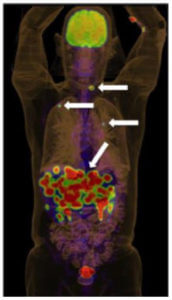PET scans in the detection of melanoma recurrence.

Unfortunately for a substantial proportion of patients with stage 3 melanoma (e.g. spread to local lymph glands), their disease recurs after surgery. Despite this, no guidelines are widely accepted for how stage 3 patients should be followed after surgery in order to detect recurrence. We thus conducted regular imaging on stage 3 melanoma patients using FDG-PET/CT scans, which are more sensitive in identifying recurrence than conventional CT scans.
In analyzing the outcomes of these patients, we identified an overall sensitivity and specificity of PET/CT scanning of 88% and 84%, respectively, in stage 3 melanoma, with a high negative predictive value per scan. This means that if a patient had a negative scan, he or she was highly unlikely to develop recurrent disease before the next scan. In addition, if a patient had a negative scan 6-months after surgery, he or she had only an 11-28% chance of the disease returning beyond that point. Although additional abnormalities not related to melanoma were identified in 12% of patients, use of PET/CT allowed 36% of truly relapsed patients to undergo surgery that offered a chance of cure. In addition, non-melanoma cancers were identified in 7% of patients.
This study is the first real time application of PET surveillance in stage 3 melanoma. Early detection of relapsed disease could increase the proportion of patients who are offered potentially curative surgery, as well as early initiation of effective drug-based therapies. For stage 3 melanoma patients, PET/CT offers sensitive detection of relapse and reassurance from negative scan results.
